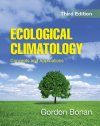![Ecological Climatology Ecological Climatology]()
Click to have a closer look
About this book
Contents
Customer reviews
Biography
Related titles
About this book
The third edition of Gordon Bonan's comprehensive textbook introduces an interdisciplinary framework to understand the interaction between terrestrial ecosystems and climate change. Ideal for advanced undergraduate and graduate students studying ecology, environmental science, atmospheric science, and geography, it reviews basic meteorological, hydrological, and ecological concepts to examine the physical, chemical, and biological processes by which terrestrial ecosystems affect and are affected by climate. This new edition has been thoroughly updated with new science and references. The scope has been expanded beyond its initial focus on energy, water, and carbon to include reactive gases and aerosols in the atmosphere. The new edition emphasizes the Earth as a system, recognizing interconnections among the planet's physical, chemical, biological, and socioeconomic components, and emphasizing global environmental sustainability. Each chapter contains chapter summaries and review questions, and with over 400 illustrations, including many in color, Ecological Climatology will once again be an essential student guide.
Contents
1. Ecosystems and climate
Part I. The Earth System:
2. Components of the Earth system
3. Global cycles
Part II. Global Physical Climatology:
4. Atmospheric radiation
5. Atmospheric general circulation and climate
6. Earth's climates
7. Climate variability
8. Climate change
Part III. Hydrometeorology:
9. Soil physics
10. Water balance
11. Watershed hydrology
12. Surface energy fluxes
13. Turbulent fluxes
14. Soil moisture and the atmospheric boundary layer
Part IV. Biometeorolgy:
15. Leaf temperature and energy fluxes
16. Leaf photosynthesis and stomatal conductance
17. Plant canopies
Part V. Terrestrial Plant Ecology:
18. Plant strategies
19. Populations and communities
20. Ecosystems
21. Soil biogeochemistry
22. Vegetation dynamics
23. Landscapes and disturbances
24. Global biogeography
Part VI. Terrestrial Forcings and Feedbacks:
25. Terrestrial ecosystems and earth system models
26. Seasonal-to-interannual variability
27. Biogeophyscial climate-vegetation dynamics
28. Anthropogenic land use and land-cover change
29. Carbon cycle-climate feedbacks
30. Nitrogen, chemistry, and climate
31. Aerosols, chemistry, and climate
32. Urbanization
33. Climate intervention and geoengineering
34. Co-evolution of climate and life
References
Index
Customer Reviews
Biography
Gordon Bonan is senior scientist and head of the Terrestrial Sciences Section at the National Center for Atmospheric Research, Boulder, Colorado. His research focuses on the interactions of terrestrial ecosystems with climate using models of Earth's biosphere, atmosphere, hydrosphere, and geosphere. He has published more than 120 peer-reviewed articles on land-atmosphere coupling and how changes in vegetation alter climate. He is a member of the American Geophysical Union, American Meteorological Society, and Ecological Society of America. He is a Fellow of the American Geophysical Union and has served on advisory boards for numerous national and international organizations and as an editor for several journals.
Textbook
By: Gordon B Bonan(Author)
724 pages, 32 plates with colour illustrations; 402 b/w illustrations, tables
Reviews of the previous edition:
"Gordon Bonan's excellent Ecological Climatology [...] provides an up-to-date status report on ecosystem-climate interactions [...] across a broad range of disciplines. The text is clearly written and little specialized knowledge is required to read it [...] [This book] clearly outlines the scope of possibility for integrating the physics of climate, the biological principles of ecology, and the biogeochemical pathways that link atmosphere and land surface."
– David S. Gutzler, Natural Resources Journal
"[...] [this book] successfully integrates fundamental concepts in climatology and ecology [...] I highly recommend [it] for climatologists and meteorologists interested in better understanding the role of vegetation in the climate system, or ecologists and plant physiologists interested in better understanding the role of the climate system in vegetated ecosystems."
– Bulletin of the American Meteorological Society
"[...] extremely well-written, and even the more technical parts are accessible to a non-specialist."
– Pam Berry, Environmental Conservation
"[...] highly recommended for students in the atmospheric sciences and physical geography, and for reference libraries [...] I congratulate Cambridge University Press on the quality of their workmanship in bringing this manuscript to publication."
– Ted Munn, Bulletin of the Canadian Meteorological and Oceanographic Society
"The well-organized second edition of Ecological Climatology can serve as a basic guide for advanced students to help them visualize the relationship between climate change and ecosystem responses and services."
– V. G. Kakani, Choice







































